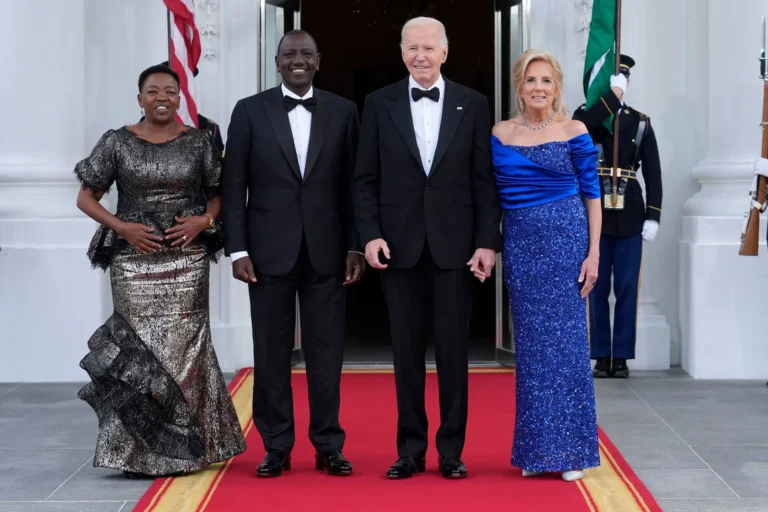U.S. President Joe Biden has notified Congress of his intent to designate Kenya as a Major Non-NATO Ally
He said this was in accordance with section 517 of the Foreign Assistance Act of 1961.
“I am making this designation in recognition of Kenya’s many years of contributions to the United States Africa Command area of responsibility and globally and in recognition of our own national interest in deepening bilateral defense and security cooperation with the Government of Kenya,” said Biden in a message to Congress on May 23, 2024.
The announcement came during Ruto’s official state visit at the White House this week.
Biden said Kenya is “one of the United States Government’s top counterterrorism and security partners in sub-Saharan Africa, and the designation will demonstrate that the United States sees African contributions to global peace and security as equivalent to those of our Major Non-NATO Allies in other regions.”
Kenya’s President William who is visiting the United States welcomed the initiative, saying it will strengthen military cooperation between the two countries.
Ruto said Kenya’s friendship with the U.S. is based on a strong foundation of shared values.
“We both believe in freedom,” Ruto said.
“We believe in democracy. We believe in the rule of law. We believe in inclusivity, equality and, of course, in shared prosperity that is guaranteed by peace and security.”
Kenya has been a close U.S. partner in countering al-Shabab, an Islamist militant group based in neighboring Somalia.
Kenya is also leading the Multinational Security Support Mission in Haiti in response to Haiti’s request for international support to address insecurity in the Caribbean nation.
Kenya has pledged to send 1,000 police to Haiti to restore safety and security to the country beset by widespread violence and civil unrest.
United States had considered Uganda as a strategic ally in countering terrorism in the region.
During the reign of President George Bush, Washington provided Uganda billions of dollars in logistical assistance to address insecurity in the region especially Somalia.
In December 2002, the Bush administration certified that Uganda was again eligible for preferential trading status under the African Growth and Opportunity Act (AGOA).
The Leaders renewed U.S. – Uganda cooperation on the global war on terrorism, regional stability and HIV/AIDS.
The Ugandan HIV/AIDS approach served as the model for President Bush’s Emergency HIV/AIDS plan for prevention.
However, relations between Washington and Uganda took a new twist with the election of President Barack Obama.
Informed officials say U.S. support for Uganda’s military has waned over the years.
The U.S. has since slapped sanctions on Ugandan officials for passing the Anti-Homosexuality Act and alleged abuse of human rights. Biden suspended Uganda from the benficiaries of AGOA.
The U.S.’ decision to abandon Uganda as its major strategic ally in region and embrace Kenya is also seen as a result of Kampala’s warmer ties with Russia and China.
Kampala has not condemned Russia’s invasion of Ukraine and continues to strengthen its defence cooperation with Moscow at the chagrin of Washington.
On Friday, May 24, Ruto visited the Pentagon where U.S. Secretary of Defense Lloyd J. Austin III welcomed the elevation of the U.S.-Kenya relationship, noting the strategic working relationships between the two countries’ militaries and defense civilians.
“This designation underscores our close relationship,” Austin said. “And it demonstrates our deep appreciation for your contributions to peace and security in Africa and beyond.”
Meaning of non-Nato ally
According to the U.S. Department of State, the Major Non-NATO Ally (MNNA) status is a designation under U.S. law that provides foreign partners with certain benefits in the areas of defense trade and security cooperation.
The Major Non-NATO Ally designation is a powerful symbol of the close relationship the United States shares with those countries.
While MNNA status provides military and economic privileges, it does not entail any security commitments to the designated country.
From the MNNA designation, Kenya will be eligible for loans of material, supplies, or equipment for cooperative research, development, testing, or evaluation purposes.
Kenya will also have eligibility as a location for the U.S.-owned War Reserve Stockpiles to be placed on its territory outside of U.S. military facilities.
Kenya can now enter into agreements with the United States for the cooperative furnishing of training on a bilateral or multilateral basis, if the financial arrangements are reciprocal and provide for reimbursement of all U.S. direct costs.
The East African economic powerhouse will be eligible, to the maximum extent feasible, for priority delivery of excess defence stockpiles and consideration to purchase depleted uranium ammunition.
Moreso, Kenya will be eligible to enter into an MOU or other formal agreement with the U.S. Department of Defense for the purpose of conducting cooperative research and development projects on defense equipment and munitions.
The designation also allows Kenyan firms, as with NATO countries, to bid on contracts for maintenance, repair or overhaul of the U.S. Department of Defense equipment outside the United States.
Kenya will further benefit from funding to procure explosives detection devices and other counter-terrorism research and development projects under the auspices of the Department of State’s Technical Support Working Group .
Currently, 18 countries which are designated as MNNAs are Argentina, Australia, Bahrain, Brazil, Colombia, Egypt, Israel, Japan, Jordan, Kuwait, Morocco, New Zealand, Pakistan, the Philippines, Qatar, South Korea, Thailand, and Tunisia.




